Taking "Fine Art" Literally - Planned Pooling with Rowan Fine Art Aran
As you may know, I am a lucky girl, and receive sample skeins of new yarns from Rowan Yarns. I was head-over-heels for their fingering weight sock yarn, Fine Art.
 |
| My Fine Art Tee |
 |
| My Fine Art Hood |
But then I got this in the mail, Fine Art's big brother: Fine Art Aran!
To be honest, I did not like it at first! The colors in the skein seemed to be such a mish mash, I didn't know how on earth they would ever knit up well.
That being said, they do look good together in this parrot! 😁
I do know people love highly-variegated yarns, so I wondered... what could I do to properly embrace this one?
One of the reasons I'm not into variegated yarns is COLOR POOLING. This seemingly haphazard shade pooling is demonstrated well in some of the garments from the Fine Art Aran Mini-Collection:
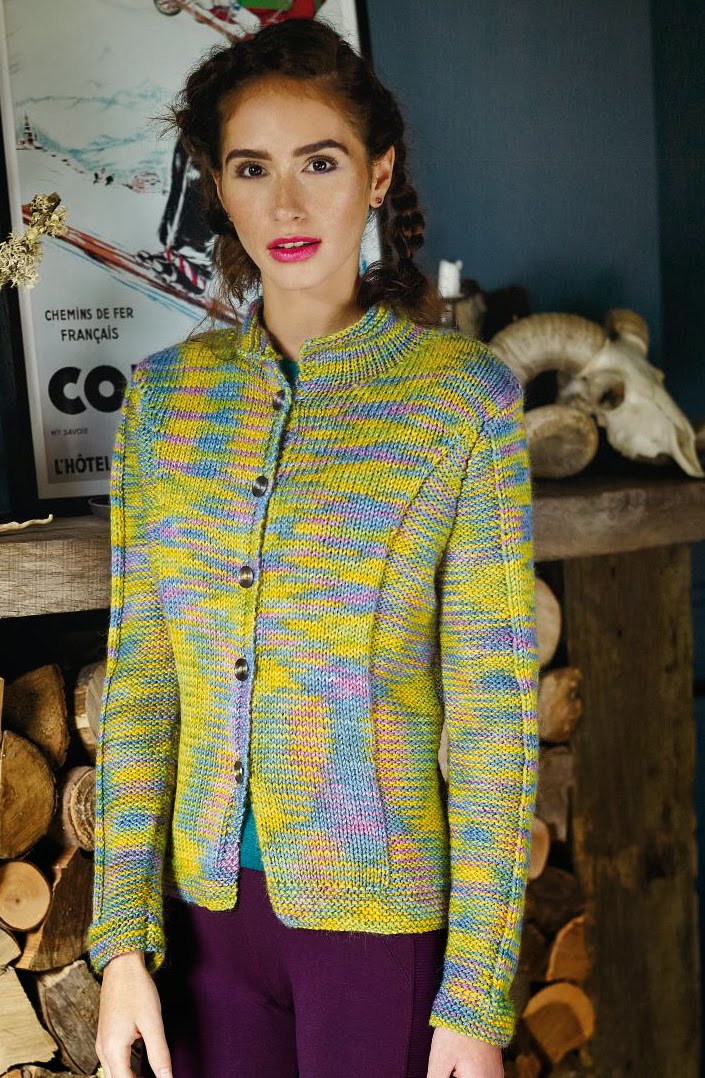 |
| See Van Gogh on Ravelry |
It works better in this free pattern, Jupiter -- but do you know why?
It's because of shaping. You see, this type of yarn is "space-dyed", a method that forces each color to occupy a very specific length in the skein. If your rows are all one width (like in a Jupiter cardigan front above), the yarn will always pool the same way. If you have waist shaping like in the Van Gogh cardigan, the colors will cover a different number of stitches because the rows get wider (increases) or narrower (decreases).
You can tell if you have a space-dyed yarn if you open the skein and see stark, defined color changes:
You can tell if you have a space-dyed yarn if you open the skein and see stark, defined color changes:
This is done to great effect in sock yarns from Opal, where one yarn creates intentional striping colorwork. Look, another Van Gogh! There is a whole series of Opal Van Gogh socks, colored after his paintings.
How on earth do they manage that, you ask? Planned Pooling!! Basically, if you know the width of the item you are going to knit (and a sock is generally a predictable width for most people), you can dye yarn so that it pools together to make a pattern.
WOWZERS, WATERMELONS!!
 |
| Originally from knitpurlgirl.etsy.com |
But how about working it backwards? Can you take a space-dyed yarn and figure out the pattern it will make? Hell, yeah.
Karla Steubing (a.k.a. Statnerd on Ravelry) is the queen of Planned Pooling on the internet. Read her detailed article in Twist Collective, and check out some of her projects on Ravelry:
There is a calculator on the web for this, plannedpooling.com, so let's do it.
1. Open up your skein (or pull many lengths of your ball and loop it into a skein) to see the color order, starting anywhere.
I saw 12 colors, in a 6-color repeat:
Green - Orange - Green - Blue - Purple - Blue
NOTE: Make sure to measure each wave of color, even if they repeat themselves, the hand-dyer may have made some of them different lengths!
NOTE: Make sure to measure each wave of color, even if they repeat themselves, the hand-dyer may have made some of them different lengths!
2. Make a swatch (about 30 sts wide), and record how many stitches each color band takes. It will be a bit different each time the color comes up, so take an average.
This is where my note above came in handy... one "orange" was 7 stitches, but the other was 9!
This is where my note above came in handy... one "orange" was 7 stitches, but the other was 9!
3. Start knitting again for a few rows (maybe 50 sts this time) and double- check your stitch counts. If you are falling short most of the time, decrease the number of stitches in that color band. It's much easier to loosen stitches than to tighten them, believe me.
4. Go to plannedpooling.com. Add colors until you have enough, then go through the color wheel to pick the perfect colors. End by filling in the number of stitches for each color.
5. Start a "virtual" knit. Change the stitch count by one to see the magical changes!
5. Start a "virtual" knit. Change the stitch count by one to see the magical changes!
6. IMPORTANT: I'm not sure a knitter wrote this program. A knitter's chart starts at the bottom right and goes left. Well... this chart will read like a book. To fix this, turn it 180 degrees, clockwise.
7. Cast-on your favorite stitch count and knit! You can use the print-out as a chart (much like a colorwork chart), or you can just memorize the number of stitches you need for each color.
NOTE: It is important that you keep to the number. If you come out with less stitches, pull the stitches very tight until you come close. If you come out with more stitches, loosen them up to get to the right number. I thank this blog post for this crucial advice!
8. If you eventually find yourself off by a stitch, that's ok. I left out a stitch 1/3 through and didn't notice until much later, but the eye can't see the difference. Don't do this too often though, you will notice eventually!
Now, one of the problems with a fun planned pooling project like this is that you're making squares/rectangles... and there are a limited number of projects that use this shape, right?
I thought about sewing it into a cowl, much like Life Lackadaisical's in-the-round "swatch cowls".
I thought about a pillow with a fabric backing... and this is a living room that would suit some of the colorways. 😂
And then I thought... if it's called Fine Art, let's make it literally into fine art!
It took A LOT of nails. I gave up at some point, cuz really, it was okay, I wasn't going to sell it.
See my Fine Art, Literally on Ravelry
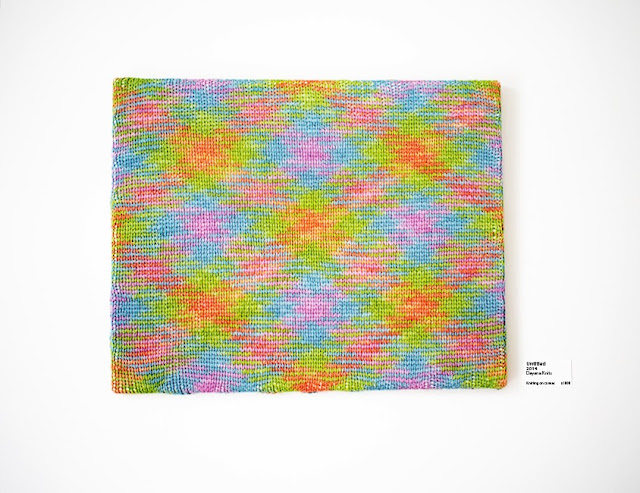
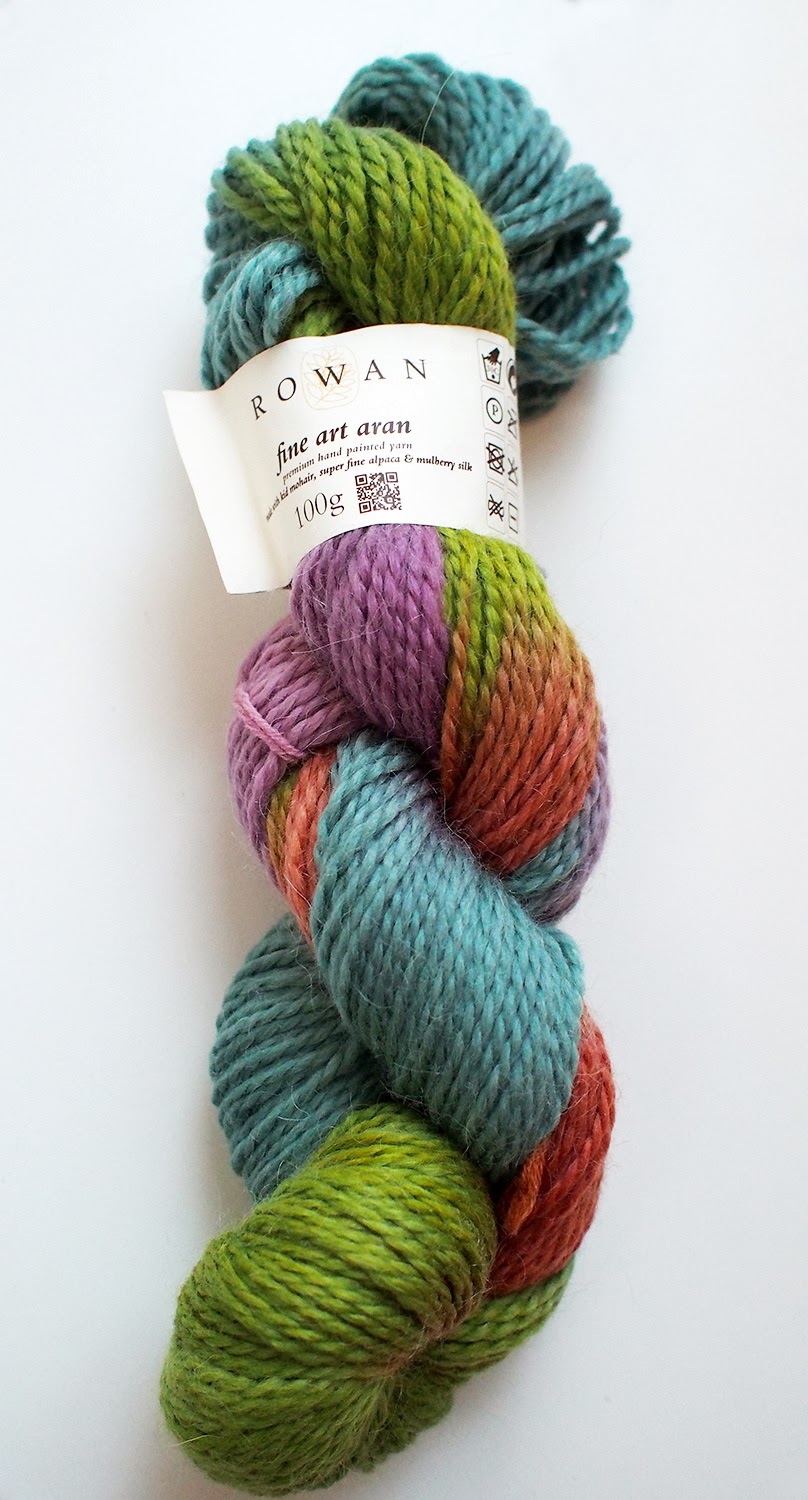


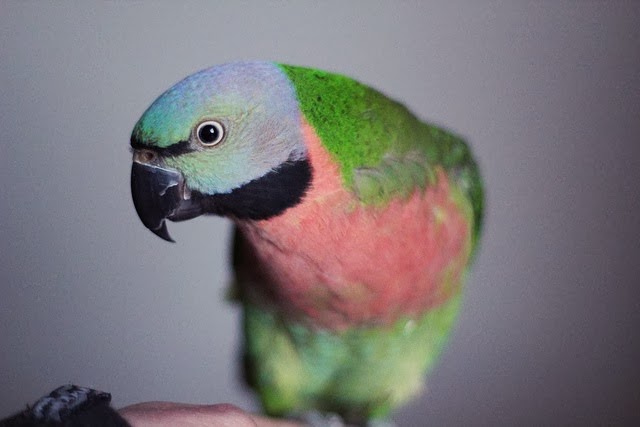




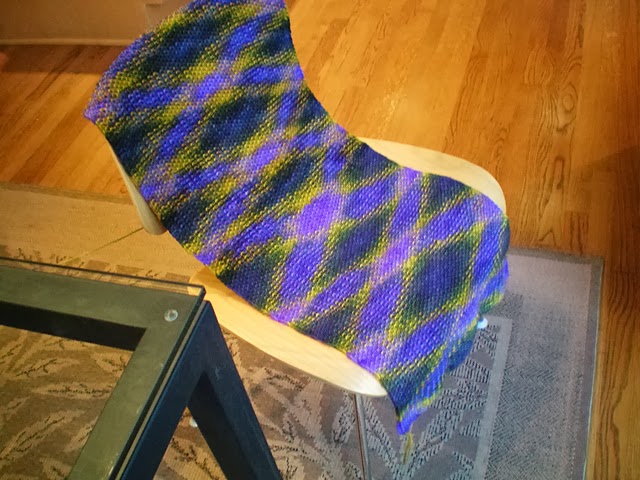



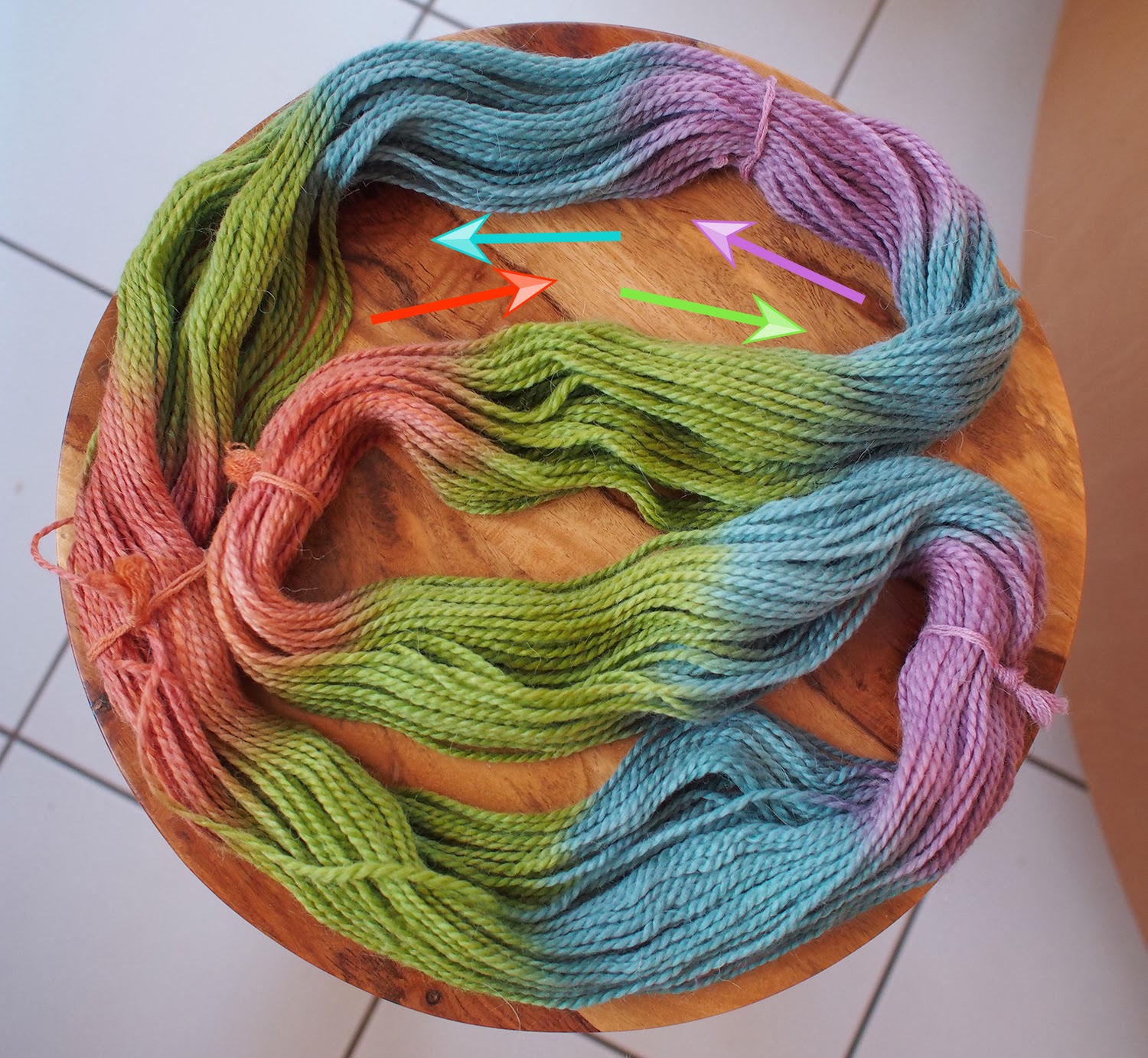




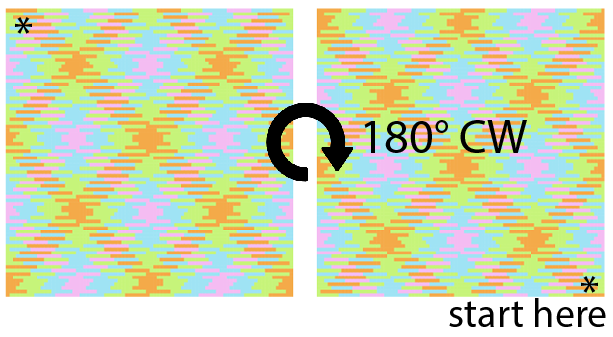

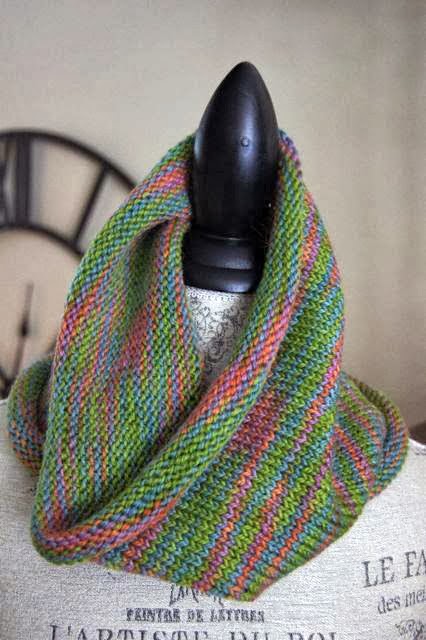





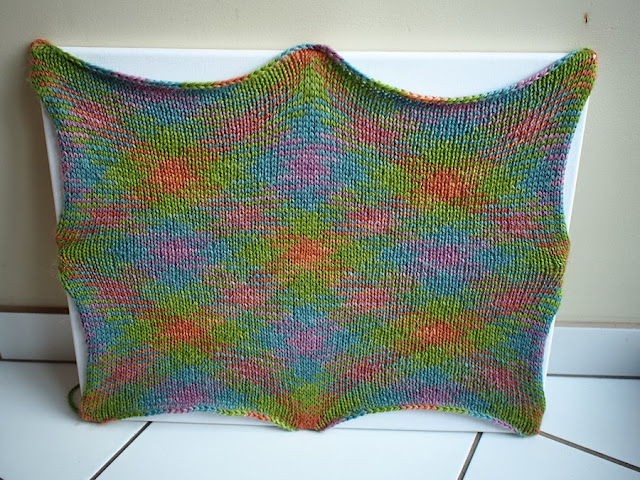





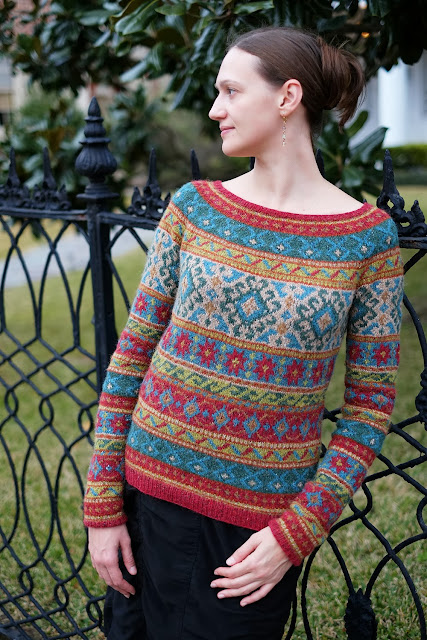
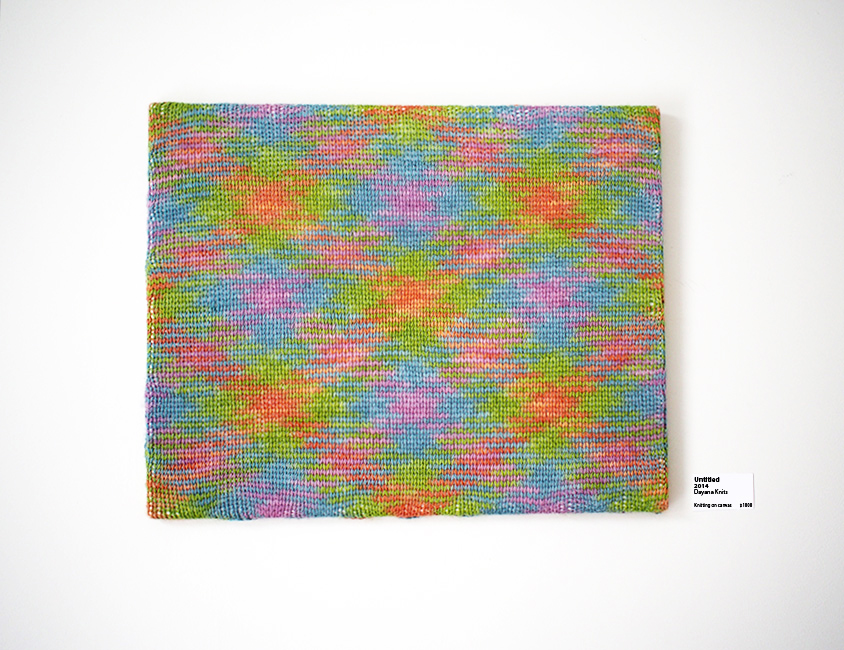
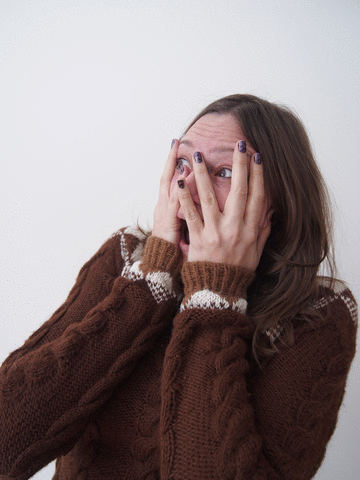
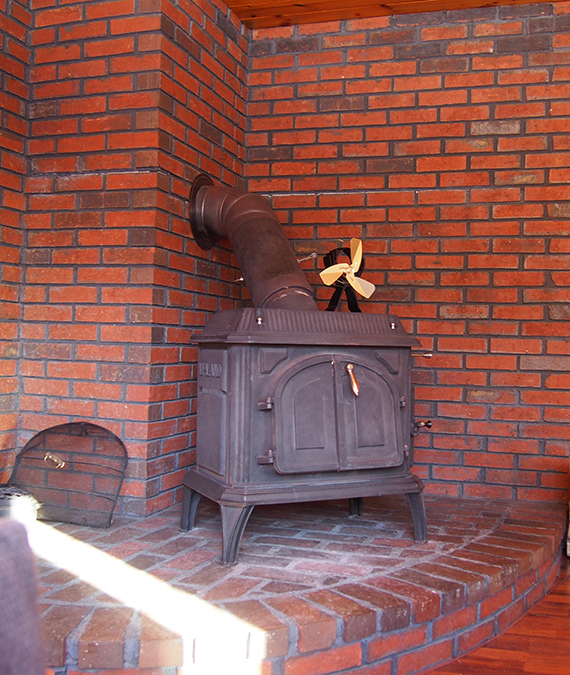
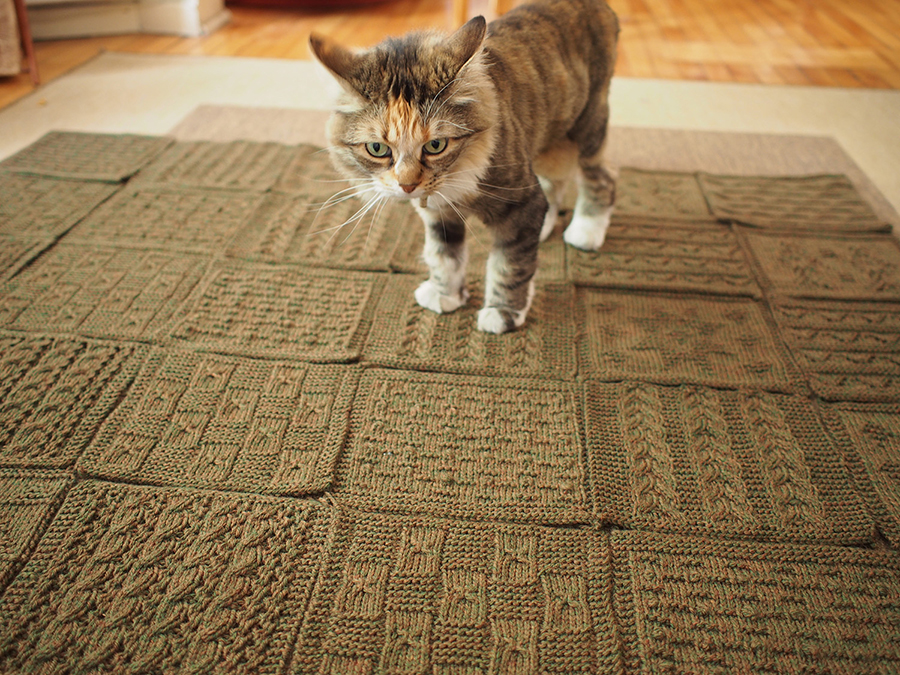


Just amazing! You are just so clever and talented!!
ReplyDeleteYou are a knitting genius. This is awesome. It would be perfect for my imaginary yarn room:). Maybe machine sewing it onto a fabric first would call for less nails?
ReplyDeleteAbsolutely! This is really a question of pure laziness. I thought, how could I get away with this with less work and stuff that is mostly in my house already? Now, see, I don't really like the colors in this yarn. But if I DID, I certainly would use a backing, that is a grand idea.
DeleteI can't think of a better use for this yarn... because I also don't particularly like strongly variegated yarns. Planned pooling is so, so clever (math in action!), but the end result always seems to give me a headache.
ReplyDeleteQuick comment / typo notice: surely the yarn content can't be "50% wool, 25% alpaca, 25% mohair, 5% silk" - these add up to 105%.
Aha, thank you for that! It is only 20% mohair, off to fix it. But see, now you've proven to me that you are a math person too, headache or no! ;)
DeleteThanks for this extremely interesting, detailed and informative post! I learned a lot. And you have created a wonderful wall hanging there!
ReplyDeleteThank you, detail is everything. ;) Now, while this is fun, I can't say I would "move" this with me were I to change cities. Did I say how much I really dislike the colors? ;) However, it certainly is a conversation piece for the meantime.
DeleteIt's a very interesting blog post. I knew that there had to be math behind fighting the pooling but never spent the time to figure it out. I've made the watermelon socks and liked the way they turned. It was fun to see the watermelon appearing. I've taken 2 dye classes and have the yarn and dyes here to make some yarn.... just no time at the moment. Thanks for an excellent post.
ReplyDeleteReally, Dayana...you are one amazing knitter...and one amazing communicator!
ReplyDeleteI enjoyed this post both for the humour and technical details about planned pooling. I agree with you about strong colours in variegated yarns; even when I like the colours they can be difficult to use in a pleasing way. I like them in slip stitch patterns, alternated with a single colour yarn; theses patterns can calm the colours down so that they become more wearable!
ReplyDeleteI agree about the slip stich patterns... variegated yarns can be gorgeous when used in this way! My personal favorite is linen stitch. I believe it's used in this recent men's Rowan pattern, and I love how the yarns blend: http://www.ravelry.com/patterns/library/guido-3
DeleteOh, and I should have said, I love the finished piece - fantastic wall art, just not to wear!
ReplyDeleteI genuinely think knitted pictures will one day be as valuable as old tapestry samplers and other art. They would be hot sellers at a craft fair as well.
ReplyDeleteI think it's worth a try! :) It could be a business, there are so many beautiful yarns out there. I just found another in my stash, I'm excited to try out a larger piece with planned pooling. This stuff is Bernat, so it should be really dependably dyed. I hope. :p
DeleteWow - I am always in awe at what you come up with. I have to say I'm like a kid in a candy store when it comes to variegated yarn and then the skeins just sit in my stash and I don't know what to do with them. Thanks for pointing out the math and the pooling website. And I think the "art" is just fab.
ReplyDeleteThank you! Now it's just up to me to actually fine a skein with colors that match my couch. ha!
DeleteThank you for such an interesting and educational posting!
ReplyDeleteI think that your pricing is entirely reasonable, in the world of Art :)
ReplyDeleteHonestly, I should have added another zero! ;)
DeleteThank you for sharing this knowledge. I would have never thought of doing planned pooling.
ReplyDeleteThat's a brilliant idea! I've never tried planned pooling before, but after this I may have to give it a go.
ReplyDeleteyou are amazing. I"ve never seen something so well thought out. Your products are amazing but so far above me I can't even try at tone
ReplyDeleteI think, in the end, this is one of those projects that boggles the mind... but when you get down to the nitty gritty, it's not so difficult. If you ever feel like taking the plunge... I have your back. :) Thank you for reading!
DeleteThanks for the links and the excellent tutorial on planned pooling (and may I say that I love the striping in the 83-stitch version of this yarn. Tempting!) I wonder, though, how Rowan could make a scratchy yarn with so much alpaca in the blend? Properly sorted and spun alpaca is like butter, in my experience.
ReplyDelete-- stashdragon
The scratchiness of the yarn completely surprised me, let me tell you! Especially for the price. I've heard that if the alpaca used has a lot of "guard hairs", they prickle right down into your skin, like a hairy cactus. Yikes. You can see long thick hairs on the yarn, so that must be them. THE 83 STITCH TOTALLY TEMPTED ME... if I had another skein it would have been the diptych, lol! But I had to try the plaid first. If another skein falls my way...
DeleteWhat a great post! Your posts are so interesting and well put together, I only hope that one day I can develop the knitting skills you possess!
ReplyDeleteOh, you made my day. Thank you!
DeleteGreat post, Dayana! I'm so pleased that my work inspired you.
ReplyDeleteKarla (aka Statnerd)
And I hope it's like a chain reaction from here... thanks so much for reading! :D
DeleteThank you for this post! I've been puzzling over how to duplicate a project that pooled unexpectedly in an argyle-like way. This was very helpful.
ReplyDeleteMathematics and creative approach will help to create graphics masterpieces from the chaos of colors! Thanks for the post
ReplyDelete